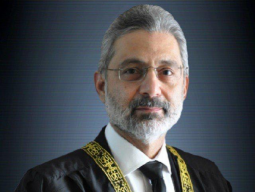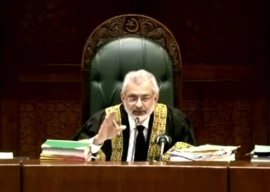
Supreme Court’s senior puisne judge Justice Sardar Tariq Masood, who is also a member of the Supreme Judicial Council (SJC), has recommended to the body to dismiss the complaints against two serving SC judges and two former chief justices of Pakistan.
Some citizens filed a complaint against Justice Ijazul Ahsan as well as ex-CJPs Umar Ata Bandial and Mian Saqib Nisar on the basis of their judicial orders.
They also filed another one against Justice Ayesha Malik on the same grounds.
Under the SJC inquiry rules, the SJC chairman, incumbent CJP Qazi Faez Isa, referred the two complaints against the two serving judges and two retired CJPs to Justice Masood seeking his opinion.
Justice Masood, after reviewing the complaints, sent his opinion to the SJC head, declaring that they were not maintainable as they were based on judicial orders upheld in the apex court.
It should be noted that the matter of complaints against another judge of the apex court, Justice Mazahar Ali Akbar Naqvi, has also been sent to Justice Masood for his opinion.
According to sources, about 10 complaints against Justice Naqvi have been sent to the SJC.
Different complaints were filed by lawyers and superior bars against Justice Naqvi.
In April this year, Justice Isa and Justice Masood wrote a judicial letter to Justice Bandial, then CJP and SJC head, and other members of the council to call a meeting to review the allegations of misconduct and financial corruption levelled against Justice Naqvi.
In May, then CJP Bandial, as the head of the SJC, sought an opinion from a council member about the complaints of misconduct against the SC judge.
According to Section 7 of the SJC Procedure of Enquiry Rules 2005, once any information in respect of inquiry into the conduct of a judge was received by any member or the council, it shall be presented to the council’s chairman, “who; shall (a) refer the same to any member of the council to look into the said information; and to express his opinion in relation to the sufficiency or otherwise of the information; (b) if the council is satisfied that the information prima facie discloses sufficient material for an enquiry, it shall proceed to consider the same”.
It added that the member, to whom the chairman had referred the information, would “examine the same and ascertain if the information so received discloses specific particulars of misconduct, and provides factual details necessary to form prima facie opinion in respect of the guilt of the judge”.
Thirdly, if the member forms an opinion that the information does reveal sufficient material to commence an inquiry, “he shall inform the council accordingly and the information shall be placed before the council”.
Lastly, “if the member comes to a conclusion that the information is false, frivolous, concocted or untrue, he shall inform the council accordingly and may recommend action against the person who initiated the information”.
1726644792-0/BeFunky-collage-(1)1726644792-0-405x300.webp)
1730377325-0/netflix-(2)1730377325-0-165x106.webp)
1730377175-0/BeFunky-collage-(5)1730377175-0-165x106.webp)
1728377970-0/Menendez-Brothers-(1)1728377970-0-165x106.webp)



1730379446-0/WhatsApp-Image-2024-10-31-at-17-56-13-(1)1730379446-0-270x192.webp)













COMMENTS
Comments are moderated and generally will be posted if they are on-topic and not abusive.
For more information, please see our Comments FAQ